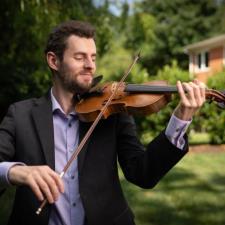Improvisation is generally not taught to classically trained musicians, which is a shame. Improvisation trains the ear to guide the body in immediate response to harmony and rhythm like no other practice. Improvisation is an art which I teach to all of my violin students as soon as they have a basic understanding of keys, through the practice of basic scales. I begin by having students master a scale, listening for correct intonation. I then demonstrate how to improvise in the key of the scale, such as G Major. As students learn more scales, I introduce modulation into the improvisation, specific to the scales now mastered. Improvisation is also the beginning of composition, which I then introduce to certain students who express interest in being able to replicate their improvisations, which I encourage them to record every time. I then teach them how to transcribe their improvisations, which incorporates Music Theory and Ear Training. Learning improvisation opens up a whole new world of musical flexibility and freedom. I make practice goals with my students and ask that after practicing scales, they set a timer for 10 minutes and record improvisation. Learning improvisation allows classical musicians to play jazz, which is a wonderful world of collaboration and teaches skilled chamber music playing.
Why should classical music students learn to improvise?
3 Answers By Expert Tutors

Gersh C. answered • 04/21/23
Violin Studio Rockville
Improvisation is the DNA of music. Yes, even classical music. The Gods of classical music Bach and Buxtehude were required to improvise on the organ every Sunday at church service. Think about this.
When you improvise you simultaneously engage all your musicality: knowledge, taste, style, virtuosity.
Musical knowledge - harmony, modulations into various keys, genres, melody, rhythm, meter, dynamics.
Taste - esthetics of your musicality; what do you find the most beautiful and compelling in the world of sounds.
Style: how do you recreate a musical epoch with its' colloquial expressions and idioms.
Virtuosity - how well you mastered your instrument. What are your expressive tools you can use on a spot.
I would say you are as good a musician as you are an improvisator.
One of the most exciting music experiences I have had was a group improvisation concert at an international festival in 2019.

Lisa Kaye J. answered • 07/03/21
Experienced Violin & Viola Teacher
Yes! All musicians should learn to improvise.
I'm speaking from personal experience of NOT really learning to inprovise until long after I had a music degree and was teaching young string players. A perfectionist at heart, I relished learning to play every note on the page as perfectly as possible. As a child I was good at it. As a college music major, I often struggled to achieve such a seemingly impossible feat, yet a necessary goal.
As a teacher, in the public schools, I'm always inpressed with students who experimented and discovered ways to play (such as shifting or playing spiccato) that I remember struggling to learn. Then, I was gradually exposed to arranging, a little jazz, and other improvising opportunities. Overtime I've learned to cover mistakes with improvising and discovered that as my ability to compose-in-the-moment has kept nerves in check and increased enjoyment.
This summer my district gave me a three week summer strings program (3rd-11th grades) with covid money. I focused on fiddling melodies with improvised accompaniments that even my beginners could try. Some students clearly enjoyed playing like never before. Others struggled, but succeeded in taking small steps. Everyone was challenged.
I've decided that being able to improvise is the essence of being a musician. It doesn't replace classical skills; it enhances them.
Still looking for help? Get the right answer, fast.
Get a free answer to a quick problem.
Most questions answered within 4 hours.
OR
Choose an expert and meet online. No packages or subscriptions, pay only for the time you need.





